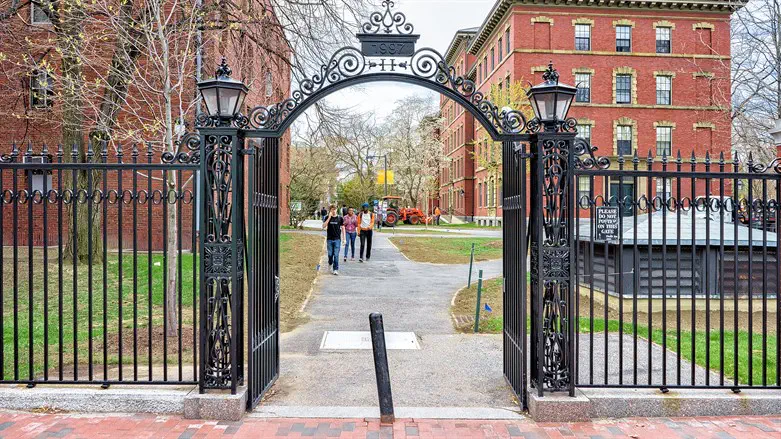
(JNS) Harvard prides itself on ranking first in all things. And now they do—on three measures of campus antisemitism.
The AMCHA Initiative, which tracks campus antisemitism, recently issued a report covering the 2021-2022 school year. It quantifies threats to Jewish identity, explained as the redefinition, denigration and suppression of Jewish identity. Amcha’s study shows a coordinated attempt to redefine for Jews what it means to be Jewish and what acceptable Jewish expression entails.
There were 254 incidents that fit at least one category—redefinition, suppression or denigration—“at 63 (58%) of the 109 U.S. schools” most popular with Jewish students. Redefinition and denigration were most likely to take place on campuses with five or more faculty members supportive of academically boycotting Israel. Suppression, however, was most likely on campuses with “one or more anti-Zionist student groups.” Harvard, with 25 incidents, topped every category.
Harvard Public Affairs & Communications and President Lawrence Bacow did not respond to requests for comment. However, it’s clear the campus climate has changed. Among numerous examples, in Feb. 2022, Hillel Executive Director Rabbi Jonah Steinberg noted “the anti-Israel stickers appearing on Sabra hummus in the dining halls, the tearing down of Harvard Hillel posters all over campus, about which the Dean of Students Office had to issue a statement just this past week, and the black-colored posters everywhere against the Harvard College Israel Trek.”
This is not 1990s Harvard, when the “student body was said to be nearly a quarter Jewish” and those students were warmly welcomed. A mere 5.3% of Harvard’s class of 2023 identifies as Jewish, along with 5.2% of the class of 2024 and 7.4% of the class of 2025. So, not only is the campus climate more hostile, but there are fewer Jewish students to protest it.
Harvard sophomore Alex Bernat recalled Passover 2022, when “a swastika is found in [undergraduate dorm] Currier House, which went underreported by [student newspaper] The Crimson, the PSC [Harvard College Palestine Solidarity Committee] put up a wall with Holocaust imagery and antisemitic statements and the school paper endorsed BDS.” Bernat reflected, “Day-to-day, I don’t feel much antisemitism or anti-Zionism, but when it flares up here, it flares up quite massively.”
One Jewish, Zionist Harvard graduate who works at the university, Ira Stoll, said, “having been around the university now on and off for more than 30 years, the level of antisemitism on campus over the past year is shocking, embarrassing, disgraceful—like nothing I’ve seen before.”
Stoll, who is the managing editor of Education Next, which is based at the Harvard Kennedy School, said, “All of us who care about the University really need to work urgently to improve the situation or else face a real risk of Harvard losing Jewish talent and excellence to other, less hostile institutions.”
So, what can be done to improve campus life at Harvard and elsewhere?
Zionist families whose children aren’t spending their college years in Israel need a college guide with detailed student commentary, indicating which campuses welcome Jewish and Christian Zionists.
Families should fortify relevant religious and historical education pre-college. When students hear attacks on Jews, Judaism, Zionists or Israel, they should recognize falsehoods and, if they feel comfortable doing so, counter them.
Jewish Studies Zionist Network scholars should offer videos and podcasts to educate high school and college students about Israel, along with Jewish history, literature, culture and religion.
Synagogues and other Jewish organizations, like the Harold Grinspoon Foundation, should send Jewish high school seniors Ben Freeman’s Jewish Pride: Rebuilding a People. Freeman offers an overview of Jewish history and antisemitism and encourages pride in Jewish identity.
Finally, more students from Jewish and Christian Zionist families should visit Israel and experience the country on its own terms. While Covid affected Israel trips, Brandeis University Professor Leonard Saxe estimates that, by age 18, “at least 15% and perhaps close to 20%” of American Jews have been to Israel. However, only 7% of evangelical Christians of any age have visited Israel.
Knowledge is the best antidote to slanted narratives. Parents, campuses have changed. Prepare your students.
Melissa Langsam Braunstein is an independent writer in metro Washington.